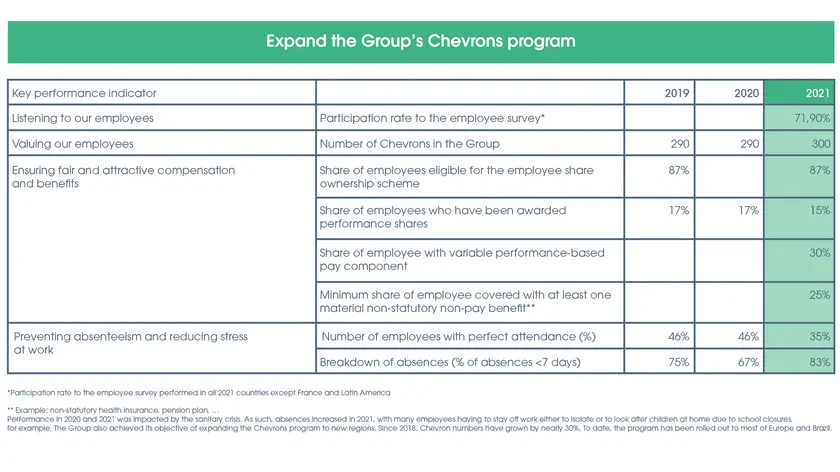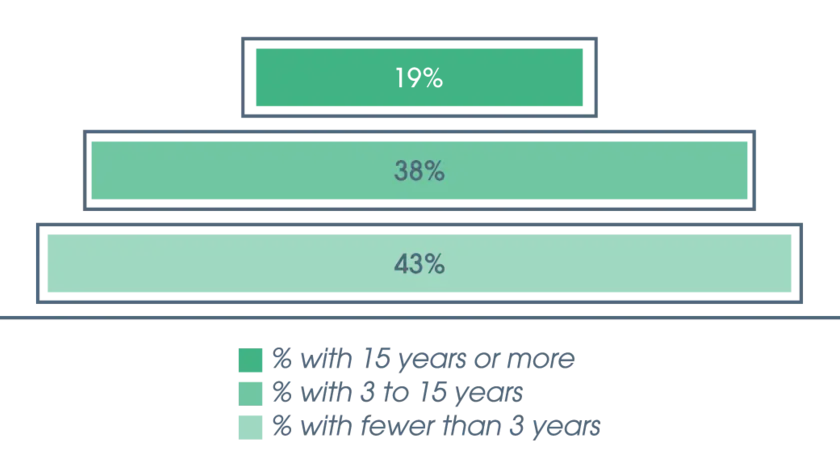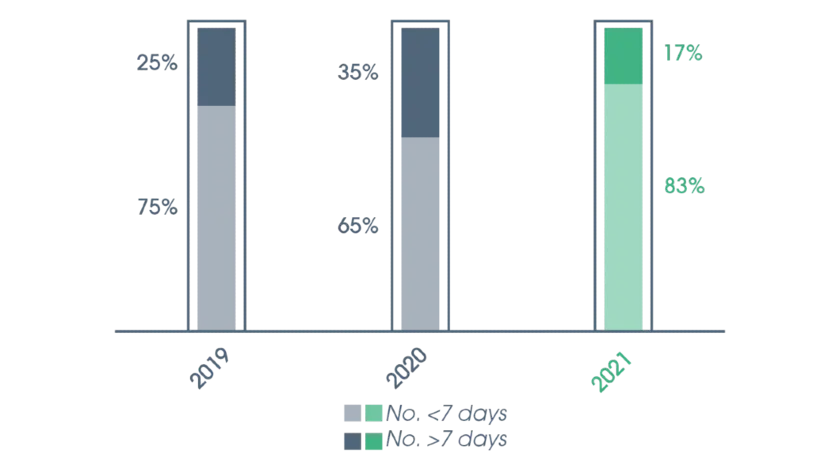Listening to, valuing our employees, and ensuring their well-being at work
At the demand of its stakeholders, the Group provides here some additional information on top of its 2021 Universal Registration Document. This information, referring to 2021, focus especially on employee satisfaction, social dialogue, compensation and benefits and well-being at work.
Elis believes that the well-being of its employees is a key responsibility of the company. In parallel with its policies and training programs, which aim to develop the skills and protect the health and safety of its employees, Elis ensures constant improvements in the working environment and conditions so as to maintain employee engagement and satisfaction, in order to support talent retention and the performance of the company more generally.
As a result, Elis makes every effort to ensure continuous dialogue between management and employees at every level. This is one of the main reasons why the Group favors human-size sites – in order to ensure that it can listen effectively to its employees. This continuous dialogue helps to prevent any social conflict that could arise. No large-scale social events have occurred in over 10 years, and there were zero strike days in 2021.
Policy: objectives and performance
Elis aims to ensure a good quality work life, to listen to its employees and to value them. The Group bases its actions around five major themes:
1. listening to its employees;
2. valuing employees;
3. ensuring fair and attractive compensation and benefits;
4. reducing stress at work;
5. preventing absenteeism.
The Group also favors the use of permanent contracts in order to increase the loyalty and commitment of its employees.
As part of its engagement program, the Group has set a target to:

*Participation rate to the employee survey performed in all 2021 countries except France and Latin America
** Example: non-statutory health insurance, pension plan, …
Performance in 2020 and 2021 was impacted by the sanitary crisis. As such, absences increased in 2021, with many employees having to stay off work either to isolate or to look after children at home due to school closures, for example. The Group also achieved its objective of expanding the Chevrons program to new regions. Since 2018, Chevron numbers have grown by nearly 30%. To date, the program has been rolled out to most of Europe and Brazil.
Listening to our employees
Measures implemented
- Engaging our employees
Well-being at work and the engagement of every employee are essential to the Group’s success, contribute to employee retention, and ultimately to operational excellence. It is particularly key given the characteristics of the Group’s model.
Employee engagement and well-being at work are measured periodically through a survey sent to all employees, who respond individually and anonymously. Employees can thus give their opinions on a variety of issues such as working conditions, training, career development, working time and safety via anonymous individual questionnaires. These surveys demonstrate the importance attached to corporate climate and the working environment at all levels.
The results of each employee survey are eagerly awaited and allow to determine areas of improvement specific to each site. The results are communicated to the employees by the management team together with the action plans defined in the response to the survey. This periodic measurement of employee engagement is essential for the relationship of trust that the Group maintains with its staff on a daily basis and that underpins the quality of its service. This employee survey is a key indicator of Elis’s human resource management policy.
These surveys were historically undertaken by each country on its own terms. In 2021, these surveys were undertaken with the aim of standardizing practices. Thus:
- in France, surveys are conducted site by site, in turn, every two years;
- for all other countries (excluding Latin America), at the end of 2021 the survey was, for the first time, carried out simultaneously through a single questionnaire sent to all permanent employees. This survey will be repeated every two years;
- in Brazil, the employee survey is planned to be carried out during 2023.
The Group aims to repeat the survey every two years, and thus be able to monitor the improvement in satisfaction following rollout of the action plans.
Participation in the survey, which was conducted in all countries (excluding France and Latin America), was high, with 71.90% of the employees interviewed taking part and able to share their views. The overall satisfaction rate is 61/100.
- Ensuring ongoing dialogue with employees via their representatives
At Group level in Europe, dialogue with employees takes place within the European Works Council, which has 28 members and represents 35,373 employees from 22 countries. In 2021, the discussions conducted by this body were about the management of the health crisis, its economic impacts and the actions taken to overcome it, as well as CSR actions and stakes.
Since employee representation regulations are specific to each country, employee representative bodies are created accordingly.
In France, Elis has set up representation at various levels: Group, business and site. 95% of employees benefit from such representation.
Specific bodies are responsible for health and safety issues. 95% of employees in France are represented by such a body.
In addition, the Code of Ethics states de Group engagement on this matter and its support for freedom of association. Management teams are responsible for the quality of the employee dialogue in their respective areas and are assessed on its quality. At the end of 2021, the Group had not had any significant industrial disputes for more than 10 years and reported zero strike days for the year.
- Improving employee conditions through collective agreements
Local agreements are in effect in the different Group subsidiaries. 70% of Elis employees are thus covered by a collective agreement. These agreements, which mainly govern the organization of working time, compensation, working conditions and work life quality, gender equality, employee management, the sharing of added value, and the prevention of psychosocial risks, are the result of ongoing dialogue with employee representatives and help to maintain the smooth operation of the business.
In France, Elis conducts this active negotiation policy at various levels: Group, company and site.
- Outlook
The Group’s engagement survey will be rolled out in 2023 in Brazil, enabling a standardized approach to the topic.
For the other regions, the results of the survey will be shared with employees and action plans will be implemented during 2022.
Valuing our employees
Measures implemented
- Rewarding our employees’ work: Club des Chevrons
The effectiveness of the Elis model is strengthened by a strong culture of conviviality and recognition, acknowledged as a key factor for employee engagement. The best example is Elis’s Chevrons Club (Le Club des Chevrons) which has been rewarding the most deserving production and maintenance operators every year for more than 30 years. These employees are particularly valued at the sites where they work and in their countries, and they take part in an international event lasting several days. In 2019, this club brought together employees from the entities of the former Berendsen Group for the first time, and a similar program has been set up for Brazil. Following a year of disruption due to the health crisis, the Chevrons Club for European countries was able to meet again in November 2021 in Paris. Since 2018, Chevron numbers have grown by nearly 30%.
In addition, in most countries ceremonies are held in recognition of the longest-serving employees: this is the case in France, where long-service medals are awarded, but also in Denmark, which organized a special day in July 2021 to mark one employee’s 50 years of service.
- Recognizing the skills of our employees and supporting their development
Valuing employees with regard to their skills, contributions and performance, providing them with the appropriate training and supporting their development are pillars of the Group’s HR strategy. Section 3.4.3, “Attracting and developing our employees”, has more detail on these points.
- Long-serving employees
The Group’s business culture, values and HR strategy contribute to the long-term retention of employees. As such, since 2018, the distribution of staff by length of service has remained stable. Almost 60% of the workforce have more than three years of service, with 19% of employees having over 15 years.

Ensuring fair and attractive compensation and benefits
Measures implemented
The Group’s policy is to offer all employees fair and market-competitive compensation that reflects their performance and level of responsibility. To that end, the Group seeks to follow the best practice of comparable sectors. This policy takes into account the local laws and business practices of each region and can integrate a broad range of non-statutory benefits.
Thus, employees’ skills and level of responsibility are compensated with a fixed salary matching their experience and general market practice for their business line. Depending on the level of responsibility and the country, variable compensation schemes, which aim to reward collective and/or individual performance, may be put in place:
- For the majority of operational managers, variable compensation schemes are defined in the same way in each country, with some collective objectives and some individual ones.
- For all sales and commercial teams across the Group, encompassing some our people in our operation. Indeed, our Service agent or Drivers have sales responsibility in most of our markets, such as France, Spain, Portugal or Italy. In some markets, this bonus can be significant.
- For about 500 employees in 2021 (senior managers, talent and expert employees): Elis has also committed to giving a share of the long-term financial performance and results of the company to its managers and employees, principally through long-term incentive plans. In order to recognize and retain them. The acquisition of shares pursuant to performance share plans is subject to performance conditions and continuous service. A CSR performance criterion has been introduced in 2022.
- For all employees: Compensation schemes based on collective performance may exist in some countries, whether they are compulsory legal arrangements (for example, mandatory profit-sharing in France) or are voluntarily set up by the Group according to local practices, such as in Portugal or the optional profit-sharing scheme in France.
On top of this, the Group has set up a voluntary employee share ownership plan available to all employees in 17 countries covering about 42 500 (see below).
If necessary, the Group also uses external information provided by specialist advisers in order to be certain of its positioning relative to the local reference market. Moreover, it ensures that the minimum salaries applicable in the different countries in which it operates are respected.
- Employee share ownership plan
In an effort to strengthen employee engagement and a sense of belonging in the Group in its various countries, and to help share the value created, in 2019 Elis launched its first employee share ownership plan (ESOP), Elis for all, in 16 countries. Employees participating in the collective savings plan can subscribe for Elis shares on preferential terms via a capital increase.
In 2021, a second launch took place in 17 countries (with 87% of Group employees therefore covered). 2021 saw a 35% increase in the number of subscribers. All employees in these countries, regardless of whether they are permanent or temporary, are eligible for this program as soon as they have more than three months of service.
As of December 31, 2021, the Group’s employees held 1.79% of the share capital either directly or through a mutual fund.
- Pension Savings plans and other benefits
In France, employees can access a collective savings plan, which holds the employee share ownership funds as well as a wide range of dedicated diversified savings vehicles. In addition, as of 2021, the Group has voluntarily set up a system where every employee can build their pension savings at their own pace by making payments to the collective pension plan.
In other countries, some regions have developed schemes that allow employees to save with terms adapted to local legislation or to supplement their pension through voluntary contributions with favorable terms.
- Favoring permanent contracts and limiting part-time employment
Elis favors permanent contracts, which offer stability and security to employees and allow Elis to build stable teams involved in the life and development of the company.
As at December 31, 2021, 13% of Elis Group employees were temporary, due in particular to the seasonal nature of part of the hospitality business.
Part-time contracts are limited. The number of part-time employees remains stable and is very low: less than 7% of the permanent workforce. Part-time contracts are mainly following the request of the employee. Full-time contracts also contribute to increasing employee loyalty and engagement
- A practice of remote working during the health crisis
In the context of the health crisis, Elis set up adapted ways of working to allow business continuity while guaranteeing employee safety. These ways of working included, among which home-working for the teams able to work remotely, thus allowing them to continue to operate.
Reducing stress at work
Measures implemented
As part of its general risk prevention policy, Elis is committed to promoting a healthy work environment for its employees, reducing, in particular, psychosocial risks. Through the surveys it undertakes with all its employees (see section 3.4.1 “Listening to, valuing our employees, and ensuring their well-being at work”), Elis can measure how they rate their working conditions and thus identify situations that create stress.
In France, training is given to employees, and management staff in particular, as part of this preventive action, and constitutes one way of raising awareness and understanding of psychosocial risks, their possible causes and how to prevent and overcome them. Support is also offered in some countries. In France, two social workers who are subject to professional confidentiality are available to support employees with regard to their concerns. The main areas of concern are housing, retirement and life changes.
In addition, an alert procedure, which takes into account cyberbullying, has been established. The alert procedure is described in more detail in section 3.5.5 “Continuing to integrate ethics into our business practices”.
Preventing absenteeism
Measures implemented
Absenteeism is a reality that affects the Group and that can have an operational and financial impact. Preventing short-term unforeseen absences is therefore key. This type of absence is indeed the most damaging in terms of productivity, the organization of work teams and the redistribution of work to other personnel or temporary employees.
This year, as in 2020, Elis was also confronted with absences related to Covid-19 (sick and vulnerable people, contact cases, childcare issues, etc.).
Each absence has its own particular characteristics and employers are not permitted to ask employees about the medical reasons for their absence. The Group is thus implementing a series of collective measures to try to prevent absences and limit their impact on its business.
There is no international absenteeism strategy, as this issue is very much linked to the local context (for example, influenza is not a major concern in Brazil, Chile or Colombia, unlike in European countries). Policies are decided at the national level, based on each country’s legislation and regulations, and sometimes by collective agreements for each sector.
The health crisis significantly impacted the number of employees with perfect attendance in 2021, which fell by 11 points. This was mainly due to absences caused by the health crisis. A large number of employees were forced to stay off work more regularly in 2021 due to isolation rules, school closures, etc.
Short-term absences as a proportion of all absences decreased. In our business, it is these unexpected and short-term absences that impact us the most.
NUMBER OF EMPLOYEES WITH PERFECT ATTENDANCE IN 2021

BREAKDOWN OF DAYS ABSENT


Preventative measures
Each site has introduced measures in accordance with their specific issues:
> vaccinations against influenza (or other diseases) are offered every year at certain sites;
> some sites pay a bonus to employees who have perfect or near-perfect attendance;
> in 2012, French entities introduced the Gest’Elis program to prevent occupational diseases, primarily musculoskeletal disorders (see below), which will be rolled out at various Elis sites outside France;
> training sessions on job-specific body movements and postures are provided to production and customer distribution staff;
> tools for monitoring absences are made available to managers and training is offered to provide them with the skills and knowledge to deal with absenteeism;
Some countries link a portion of managers’ variable compensation to the absenteeism performance of their teams.
Gest’Elis
In 2011, Elis launched an ergonomic measure called Gest’Elis. This measure is based on analysis of production work stations. For each of these work stations, information sheets offer solutions to improve work station layout/organization as well as the equipment and tools used. Information sheets also describe how to perform the task correctly and highlight tips on comfort and safety for these work stations. For certain work stations, they are accompanied by a video promoting awareness of best practices, which is offered in order to train and improve the awareness of employees and their managers. The Methods Department supports the implementation of the relevant action sheets at the Group’s production sites and the project teams take these sheets into account for new installations.
In 2015, Elis launched a similar measure in its customer distribution activity with an ergonomic analysis of the journeys made by service agents in light utility vehicles. Best practice information sheets offer solutions for fitting out these vehicles and illustrate how to use them correctly.
In France, job-specific movement and posture training is given to production operators, service agents and warehouse operators and repeated every three years. A specific booklet for production operators has been created in collaboration with a dedicated partner. This booklet, entitled “Preventing risks related to repetitive work movements,” introduces the principles of economy of effort and illustrates them in various work situations. Following the same principle, a specific booklet entitled “Preventing risks related to manual handling of loads” was created for service agents.
Ad hoc ergonomic studies have been carried out to improve the working conditions of employees with medical restrictions.
Suitable initiatives are taken in different countries, such as versatility (changing work station regularly), the compulsory breaks for exercise (10 minutes of exercise for every 4 hours of work) or warm-up sessions before starting work.
Return-to-work interview
Management may set up an informal interview after an employee returns from a short- or long-term absence. Return-to-work interviews allow the Group to demonstrate to employees not only its concern for them, but also the impact that absences can have. These interviews are conducted in full compliance with medical confidentiality obligations. The interviews update employees about the site and how business is going and gauge how employees feel about their work and their quality of life in the workplace. Appropriate measures may be taken following these interviews.
Versatility
The Group encourages employee versatility, so they can step into a variety of positions at processing centers in order to replace an absent colleague. This is ensured by cross-functional training and job adjustments or modifications to documentation material, with the simplest positions being filled by employees on fixed-term contracts.
Absences related to the health crisis
Throughout 2021, management remained committed to implementing and adapting health measures at the sites. Work processes have been adapted to minimize the risks of contamination. Personal protective equipment has been made available to all employees.
Throughout 2021, these actions were maintained and adapted according to the circumstances.
If you need information or a quote for your project, our teams are here to help. Contact us!
*Required fields
Account details
